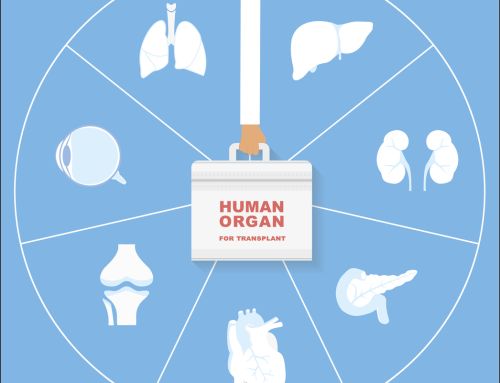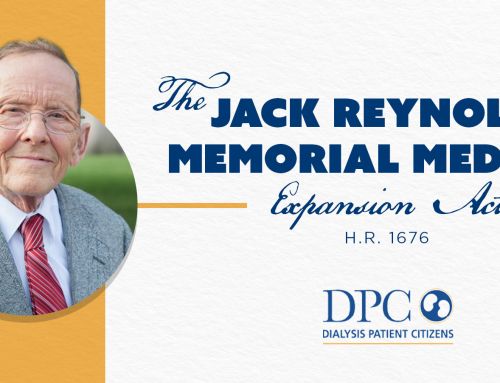Urge Support for the Comprehensive Immunosuppressive Drug Coverage for Kidney Transplant Patients Act of 2013
(Washington, DC) – In honor of National Kidney Month, dialysis patient advocates praised the introduction of the Comprehensive Immunosuppressive Drug Coverage for Kidney Transplant Patients Act of 2013 (S.323/H.R. 1325). This vital legislation will extend anti-rejection drug coverage for kidney transplant patients under the age of 65 beyond the current three year period. The bill would ensure transplant patients receive the necessary medications to maximize the life of the donated organ while using our limited federal resources more efficiently.
“While receiving a kidney transplant is a blessing for anyone with kidney failure, grappling with the financial implications of losing Medicare coverage, and potentially prematurely losing the transplanted organ, can be devastating for individuals,” said Gary Barron, DPC Patient Ambassador. “I am personally facing the looming 36-month coverage deadline and know just how important this legislation is to the thousands of Americans just like me who are deciding how to pay for these critical medications, or even whether to try for a transplant at all. I cannot fully express my gratitude to the bill’s co-sponsors for their leadership on this issues and I hope all Members of Congress come to realize how great an impact this bill would have on the health and well-being of thousands of Americans. “
The bill was introduced in the Senate on February 14th by Senators Dick Durbin (D-IL) and Thad Cochran (R-MS) and last week the House companion bill was introduced by Congressmen Burgess (R-TX) and Kind (D-WI).
“It is incredibly cruel that the gravest threat to patients who have received a transplant is the federal government mandating that they can no longer receive treatment,” said Congressman Michael C. Burgess, M.D. “Renal transplantation offers end stage renal disease patients an alternative to a lifetime of dialysis. We need to ensure that patients receive the care they need and are not subject to the federal policy that denies coverage for anti-rejection drugs after 36 months. The result of not changing this policy is a costlier return to patients and the Medicare system to dialysis.”
“This bill improves the quality of life for kidney transplant patients and helps lower their health care costs, by decreasing the need for further dialysis and reducing the chances of organ rejection,” said Congressman Kind. “Eliminating the 36-month cutoff on medication for kidney recipients is critical, commonsense policy that improves patient care.”
While Medicare will pay for dialysis for patients with end stage renal disease for life, Medicare only provides 36 months of coverage for the immunosuppressive drugs necessary for a successful kidney transplant for those patients under 65 years old. After that three-year period, many patients who are no longer eligible for Medicare struggle to find coverage or to purchase the anti-rejection medications themselves. As a result, patients often end-up back on dialysis sooner than they should; increasing both their time on dialysis as well as everyone’s wait for a transplant. Others don’t even apply for the transplant list and remain on dialysis indefinitely as they know they can’t afford the anti-rejection drugs.
This cost-effective, common-sense legislation would eliminate the current time restriction and extend Medicare Part B coverage for kidney transplant recipients under the age of 65 for the purpose of immunosuppressive drugs only, improving the lives of countless kidney transplant patients in a fiscally responsible way. In fact, a 2012 New England Journal of Medicine report estimates that extending immunosuppressive drug coverage will save Medicare approximately $200 million annually.
On March 14th, dialysis community advocates hosted a World Kidney Day Advocacy event where they raised awareness about kidney disease and this important legislation. More than 75 advocates, including patients, caregivers, nurses, social workers and dialysis facility staff, participated in more than 100 meetings with their Members of Congress and Senators encouraging support for the bill and other kidney disease related legislative issues. The three day World Kidney Day Advocacy event also included a speech from Jean Moody-Williams, Director of the Quality Improvement Group at the Centers for Medicare and Medicaid Services (CMS) Office of Clinical Standards and Quality, a legislative training session and treatment was arranged at a facility in Washington, DC, for the dialysis patients who participated.

























